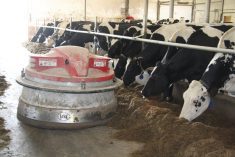John and Carrie love ranch life and working outdoors.
But after six jobs in 10 years, working on ranches in Alberta and British Columbia, they shake their heads over the shortage of good bosses.
“The last couple jobs we’ve had is the equivalent of slave labor,” said Carrie, who asked that their real names not be used for fear of employer reprisals.
John’s day starts at 7 a.m. and ends around 10 p.m. His duties include working cattle on a purebred ranch in southern Alberta, as well as lending a hand on the grain side of the operation.
Read Also

New World screwworm not seen as trade threat
Canadian cattle producers shouldn’t be worried about the New World screwworm, which has become a massive concern for ranchers in Mexico and is threatening the southern United States
He and Carrie have experienced different kinds of employers.
She fondly remembers one who provided a two-week paid vacation. At the other extreme, one required all hands to be on call 24 hours per day.
Their current employer provides a house for which they pay $150 monthly rent. The owner pays the utilities.
“This is a decent house,” she said. “We have lived in some shacks.”
There are no benefits, no health care and no workers’ compensation.
Last year, John and his former boss picked up fungal pneumonia from contaminated grain. John received no pay for seven weeks and the farmer refused to admit it was grain poisoning, even though he too was ill.
At times, they feel indentured to the ranch owner who could order them off the place with three days notice.
All this earns $1,285 clear per month. Carrie works part-time off the farm.
Many farmers like to hire couples who put down roots and stay, yet they don’t always create an inviting atmosphere, says Carrie. Some give considerable responsibility and others micro-manage to make sure they get their money’s worth.
John worked 265 hours in July and 287 hours in August.
“There isn’t another industry where people are paid like this and expected to work the hours for just a pittance,” Carrie said.
“It’s not the length of hours, it’s the lack of respect that you’re a human being. You’re doing make-work projects to fill in an hour but then you’ll be called out that night to calve for three hours.”
It is hard on family life and in some communities, their children feel snubbed at school or 4-H because their dad is a ranch hand.
John and Carrie have learned that farmers who have worked off-farm themselves are usually better employers because they appreciate what it is to be a wage earner.
While some employers seem to believe their staff are incapable of doing anything else, many people are farm hands by choice. John has paid for his own agriculture courses to learn more about the business.
When their last boss retired and John and Carrie were looking for a new ranch job, they were surprised and pleased by the number of offers. They were hired for this job without an interview.
Now, they have decided it’s time to move on.















